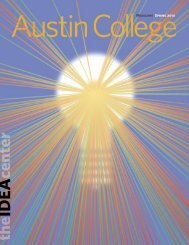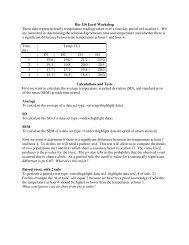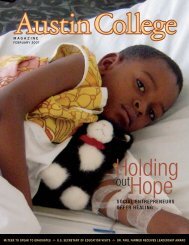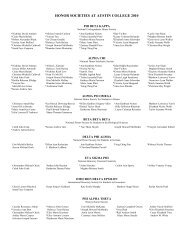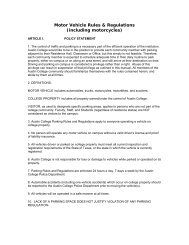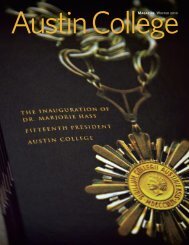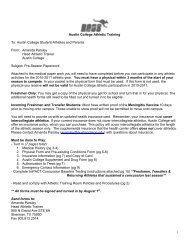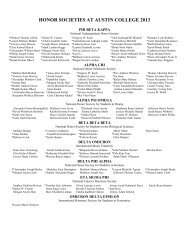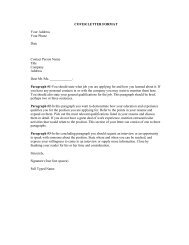Create successful ePaper yourself
Turn your PDF publications into a flip-book with our unique Google optimized e-Paper software.
RELIGIOUS STUDIESvaries. The following courses are recent orupcoming examples.■ Paul the Apostle■ Christian Thought■ Religions of Japan■ Art and Ritual in Asian Religious Traditions■ Violence and Nonviolence in Asian ReligiousTraditions■ Rituals in the Hindu Tradition■ The Erotic and the Ascetic in Indian Traditions■ Tibetan Buddhism and Politics■ Buddhist Philosophy■ Religion and Art of India and Tibet260 Intermediate Directed Study(Variable course credit)An opportunity for students to investigate subjectsin religion that are not covered by our regularlyoffered courses.265 Christian EthicsA critical study of Christian faith (as theory andpraxis) as it affects the ways in which Christiansview and act in our complex world. Major typesof ethical strategies (biblical, philosophical,historical, and contemporary) will be examined,followed by case studies on issues such as lifestyle,sex, medical ethics, and war.270 Development of Catholicand Protestant ThoughtAn introduction to the historical developmentof Christian thought – formative people, places,issues, ideas, and events. Working with selectionsfrom primary sources, the course beginswith Christianity as part of the Jewish faith andtraces the changes and continuities that defineChristian faith up to the present.275 LoveA survey of major theological/philosophical/historical understandings of the nature andsignificance of love. The influence of major figures(Plato, Augustine, etc.), historical periods,and modern scientific research will providecritical tools for reflection upon current conceptionsof love.292 Intermediate IndependentStudy Off-Campus(Variable course credit)280 Religion in AmericaA study of religious movements and thinkers inAmerica: the origins and patterns of Americanreligion, and religion’s role in the shaping ofAmerican culture and institutions.301, 302, 303 Method and Theory inthe Study of ReligionA history of the discipline of religious studies,focusing on the diversity of disciplines and approachesthat have been used to construct thenature and meaning of religion. Students willexplore the contributions of important texts/authors/insights within sociology, psychology,anthropology, philosophy, archaeology, ritualstudies, gender studies, literary and textualstudies, historical studies, phenomenology,hermeneutics, etc., as these fields have shapedthe nature of religious studies. Special attentionwill be paid to how these approaches functionin constructing assumptions and drawingconclusions within the study of Asian religions,biblical studies, or theological studies.360 Directed Study(Variable course credit)An opportunity for students to investigate subjectsin religion that are not covered by ourregularly offered courses, or to cover aspects oflower-level courses in greater depth. Generallya prerequisite of at least one previous course inreligion (as specified by the instructor).405 Indian and Tibetan PhilosophiesAn in-depth exploration of Indian and TibetanBuddhist philosophical and ritual thoughtthat has shaped South Asian and Tibetan Buddhisthistory. This course explores narratives,philosophical texts, and ritual manuals andpractices. Through primary and secondarysource materials, the competing positions ofvarious schools of Indian and Tibetan thoughton issues of epistemology, metaphysics, andethics are traced.425 Philosophy of Religion(see Philosophy 425)435 Early Christian TextsAn examination of the rhetorical, social, cultural,theological-symbolic, and ideological contextsof diverse early Christian texts, traditions,and communities, with focus also on issuesrelated to modern interpretation. The specificcontent will vary, but will always include wideexposure to fundamental issues related to methods,theories, and the history of the disciplineof New Testament and Christian origins. Somespecial topics have been: 1) the validity of theconstruction of apostolic authority establishedby Eusebius in his Ecclesiastical History by examinationof relevant second and third centurysources; 2) an analysis of the letter to Philemonas an example of the complexity involved inCOURSES OF INSTRUCTION| 145



